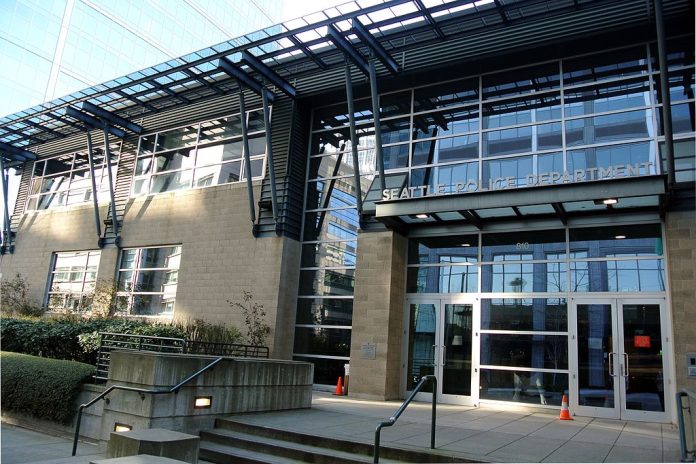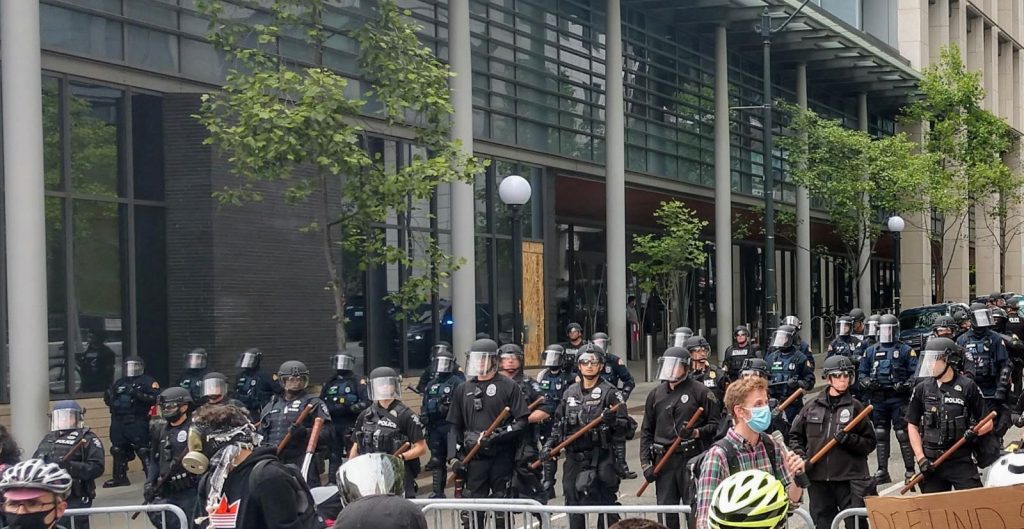With the dawning of the new year, will we finally be getting a new labor contract between the City of Seattle and the Seattle Police Officers Guild?
The labor contract between the City of Seattle and the Seattle Police Officers Guild (SPOG) covers many issues you’d expect to see in such a document: wages, benefits, overtime pay, and working conditions. However, under Washington State law, this contract also covers issues of accountability: imposing discipline on officers for misconduct, including how such cases can be investigated, how they are appealed, and the way arbitration is employed.
In addition, the contract is often cited as controlling what body of work is reserved for police officers, meaning it has implications when considering alternative emergency response for mental health crises, parking enforcement officers taking over certain duties like traffic direction at events, and non-officers taking after-the-fact reports.
The last SPOG contract was ratified by the Seattle City Council in November of 2018 in a controversial vote that at least a few council members later said they regretted. The previous contract had expired in 2014, and the new contract resulted in $65 million spent in backpay and a 17% total raise for Seattle Police Department (SPD) rank-and-file officers.
Unfortunately, the 2018 contract undermined the city’s much touted 2017 accountability ordinance by, among other things, not allowing for the civilianization of the Office of Police Accountability (OPA) — meaning officers continue to investigate other officers in a clear conflict of interest — and withholding subpoena power from the OPA and the Office of the Inspector General (OIG) to assist in collecting evidence for cases of administrative misconduct. The contract contains clear language stating that it supersedes the 2017 accountability ordinance wherever the two conflict, which to some felt like an act of bad faith.
Many groups, including the Community Police Commission (CPC), rallied together to object to this contract, but the city council still passed it in a 8-1 vote with only Kshama Sawant (recently retired) voting against it. This contract expired at the end of 2020, but until a new one is negotiated, it remains in force.
Looking forward, we can likely expect a similar amount (or more) to be spent in backpay whenever the next contract is agreed upon.
How does the contract negotiation process work?
At the beginning of the SPOG contract negotiation process, the City must identify its priorities for the next contract. As part of this process, the City holds a public hearing to seek feedback. The Labor Relations Policy Committee (LRPC) consists of representatives from the Mayor’s Office as well as five current council members and is responsible for setting the bargaining parameters for the contract, meaning what subjects are on the table during the negotiations.
The City or SPOG must then send a notification in order to negotiate a mandatory subject of bargaining, including opening a contract that’s expiring. Each side has full discretion in selecting their bargaining team, at which point negotiations can begin. A recent change in how this bargaining is conducted means there is now a representative present from the City Council Central Staff, as well as representatives from the OPA, OIG, and CPC who are allowed to be present when bargaining accountability issues. However, these representatives are given no power at the bargaining table, and they aren’t allowed to discuss anything that happens at the sessions they attend.
When the two sides are able to come to a tentative agreement, the SPOG union members vote on whether to approve the deal. If they approve, then the contract goes to the city council for a vote and the mayor signs it, making the new contract into a reality.
Because police officers are considered to be essential workers under state labor law, they are not allowed to strike as part of contract negotiations. Therefore, if the bargaining teams are unable to come to an agreement, even after mediation, the contract is brought into interest arbitration. The arbitrator conducts a hearing, listens to both parties’ proposals, and then makes a final and binding decision regarding the contract. This decision often also takes into consideration similar police guild contracts from other locales.
In the past, the general wisdom has been that interest arbitration would end in a less favorable result for the city — as well as being time-consuming and costly — but during the most recent negotiations, there has been some speculation that this balance may have shifted. This is partly because the City can now say they made certain accountability concessions in 2018 and the outcome hasn’t been positive given the monumental protests in 2020.
Moreover, District Court Judge James Robart, who oversees the city’s consent decree, has also made it clear he won’t agree to ending the consent decree unless the next contract includes certain accountability provisions. And finally, in 2022, both the Seattle Police Management Association (SPMA) that represents captains and lieutenants in SPD and the King County Police Officers Guild (KCPOG) who represents sergeants and deputies in the King County Sheriff’s Office (KCSO) finalized new contracts that allowed for more robust accountability provisions than are in the most recent SPOG contract.
At this point, the City and SPOG have been in negotiations for a couple years. It’s anybody’s guess when the two parties will reach an agreement, but it could happen at any time.
Recent developments with the SPOG contract
While the contract negotiations between the City and SPOG tend to happen in a black box, the recently passed Memorandum of Understanding (MOU) between the two parties does shine some light onto certain topics being discussed.
The MOU gives SPD officers a $225 bonus for every special event they volunteer to staff. Until a new contract is negotiated, this gives officers the equivalent of double time pay for special events shifts (normal overtime is time and a half). SPD has said this bonus should help relieve staffing strains around these special events. This agreement will cost the city $8.1 million, coming from the city’s planning reserves and covering the length of the MOU, which extends from the beginning of October 2023 through the beginning of January 2026.
In return, the City receives three things:
- They are allowed to use parking enforcement officers to help staff some positions at special events (to be determined by SPD).
- They are allowed to use park rangers in parks outside of the downtown area.
- They can implement their dual dispatch emergency response pilot, with SPOG officers allowed to clear the scene for Community Assisted Response and Engagement (CARE) responders remotely if they choose. The MOU also limits the number of CARE responders allowed to be hired to 24 and only allows them to respond to “Person Down” and “Welfare Check” calls.
Because this MOU has a clear expiration date of January 2, 2026, the issues brought up in the MOU will also need to be addressed in any new contract in order to preclude the abrupt halt of the dual dispatch pilot. An open question is whether SPOG will continue to demand premium bonuses for special events staffing in the new contract in return for allowing SPD to relieve their staffing burdens by allowing others to pitch in.
The MOU also muddies the waters in terms of trying to predict when a new contract between SPOG and the city might be agreed upon. It was designed to address emergent needs that the city wanted to do immediately without having to come to an agreement on all other aspects of the contract. Now that the MOU is in place for the next two years, it could decrease the urgency of reaching a labor agreement. On the other hand, SPOG members have now been working without a contract for three years, which is already a significant period of time.
Councilmember Mosqueda has been one of the council members sitting on the LRPC for the last several years. However, she abruptly (but quietly) stepped down in the summer, even though she had several remaining months to serve even if she were to win her election for King County Council (which she subsequently did). Observers posited she may have stepped down in protest about how labor negotiations, including those with SPOG, were going.
At a budget meeting this November, Mosqueda said, “I’ve stepped down from being on the Labor Relations Policy Committee because I have a concern around wanting to ensure that the whole scope of all of the contracts in front of us are included so that we understand the universe of contracts that still need to be negotiated.”
Mosqueda went on to say she had concerns about the MOU both because of budget realities and strategy around negotiating for further accountability measures in the final SPOG contract.
Community interest continues to grow in the new SPOG contract
Because the SPOG contract is often held up by government officials as a reason why they can’t make popular changes, whether that be strengthening police accountability or implementing alternative mental health crisis response, the residents of Seattle have a strongly vested interest in the outcome of these negotiations. The upcoming budget deficit of $218 million in 2025 also looms large, with SPD already consuming about a quarter of the general fund, a percentage that could easily grow larger.
When a potential contract is finally released for public scrutiny before a Council vote, concerned Seattleites will have one last chance to weigh in on what the new contract will mean for them, their communities, and the future of Seattle.
Amy Sundberg is the publisher of Notes from the Emerald City, a weekly newsletter on Seattle politics and policy with a particular focus on public safety, police accountability, and the criminal legal system. She also writes science fiction, fantasy, and horror novels. She is particularly fond of Seattle’s parks, where she can often be found walking her little dog.



